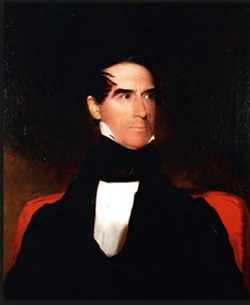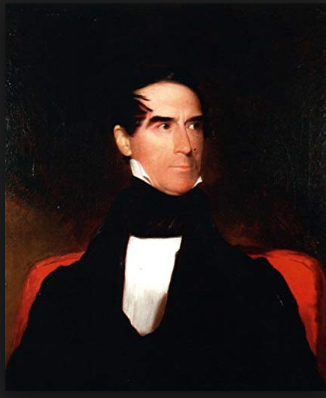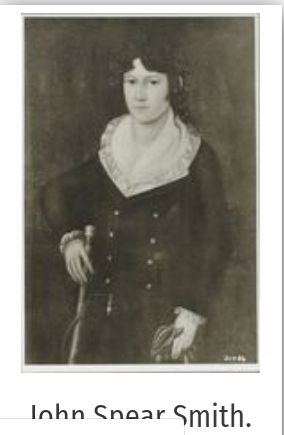He was born November 27, 1785, in Baltimore County at his father's country seat, Montebello. On arriving at the proper age, he was sent to the preparatory school of a Mr. Hall in Harford County, Maryland, and in the year 1804 entered William and Mary College. Graduating in the year 1806, he returned to Baltimore, and at once began the study of law in the office of Mr. John Purviance. He was admitted to the bar in 1808, but did not enter upon the practice of his profession, his father preferring to send him to Europe, whither he went in 1809 in the suite of John Quincy Adams, Minister Plenipotentiary to Russia. After making the tour of Europe, in the year 1811 he was charged by William Pinkney, who was then retiring from his position as Minister to Great Britain, with the affairs of the American Legation in that country. He returned to the United States in the early part of the year 1812. His father, General Samuel Smith, having been charged with the defense of Baltimore, appointed him on his staff, which position he held until the close of the war, participating in the gallant and successful defense of the city.
December 1, 1814, he married his cousin, Caryanne Nicholas, of Albemarle County, Virginia, a daughter of Governor Wilson Cary Nicholas. Having ample means he lived a life of ease, devoting himself to literary pursuits, to society, and to the rearing of his family, to whom he was tenderly attached. In the year 1821, the long established mercantile house of Smith and Buchanan, of which his father was the head, becoming involved in serious financial difficulties, he laid aside his books and applied himself earnestly to its assistance. In the year 1829 he was elected a member of the Senate of Maryland, to represent Baltimore County. In the year 1831 the House of Representatives directed the Hon. Louis McLane, Secretary of the Treasury, to have prepared a Digest, showing the existing commercial relations of the different foreign countries with which the United States had intercourse. Mr. McLane delegated John Spear Smith to General Smith this laborious duty, which he faithfully executed and the book appeared in May, 1833, styled "Commercial Relations, Vol. I."
In the year 1832 he lost his wife, an event which cast a gloom over all his after life. Continuing his farming pursuits until he became financially embarrassed by unfortunate speculations, he sold his country seat, Montebello, and moved to the city. In January, 1844, he assisted in organizing the Maryland Historical Society and was chosen its first president, holding the office to the end of his life. He was elected a corresponding member of the New-England Historic Genealogical Society in 1855. In the year 1852, having been left by the will of John McDonough one of the commissioners on the part of the State of Maryland to receive and pay over large bequests made by Mr. McDonough to charities in that State, he went to New Orleans and performed the duties of his trust with the same faithfulness that characterized him in the performance of all official duties. His father having died in the year 1839, he became the president of the Society of the Cincinnati for the State of Maryland. He held this office until his death, taking a deep interest and pride in this relic of Revolutionary days. In December, 1859, he was commissioned by Governor Hicks of Maryland, Chief Judge of the Orphans' Court of Baltimore, which position he filled for four years, the term of his appointment.
After this he retired from all active pursuits, with the exception of his duties as president of the Historical Society. He died in Baltimore, November 17, 1866, leaving the following children:—Margaret, who married Robert Hill Carter, of Virginia; Mary Mansfield, who married Judge Samuel S. Nicholas, of Kentucky: Samuel, Thomas Jefferson, John Louis, Robert Carter, and Wilson Cary.
Biography source - Google books "Memorial Biographies of the New England Historic Genealogical Society", New England Historic Genealogical Society, 1905.
He was born November 27, 1785, in Baltimore County at his father's country seat, Montebello. On arriving at the proper age, he was sent to the preparatory school of a Mr. Hall in Harford County, Maryland, and in the year 1804 entered William and Mary College. Graduating in the year 1806, he returned to Baltimore, and at once began the study of law in the office of Mr. John Purviance. He was admitted to the bar in 1808, but did not enter upon the practice of his profession, his father preferring to send him to Europe, whither he went in 1809 in the suite of John Quincy Adams, Minister Plenipotentiary to Russia. After making the tour of Europe, in the year 1811 he was charged by William Pinkney, who was then retiring from his position as Minister to Great Britain, with the affairs of the American Legation in that country. He returned to the United States in the early part of the year 1812. His father, General Samuel Smith, having been charged with the defense of Baltimore, appointed him on his staff, which position he held until the close of the war, participating in the gallant and successful defense of the city.
December 1, 1814, he married his cousin, Caryanne Nicholas, of Albemarle County, Virginia, a daughter of Governor Wilson Cary Nicholas. Having ample means he lived a life of ease, devoting himself to literary pursuits, to society, and to the rearing of his family, to whom he was tenderly attached. In the year 1821, the long established mercantile house of Smith and Buchanan, of which his father was the head, becoming involved in serious financial difficulties, he laid aside his books and applied himself earnestly to its assistance. In the year 1829 he was elected a member of the Senate of Maryland, to represent Baltimore County. In the year 1831 the House of Representatives directed the Hon. Louis McLane, Secretary of the Treasury, to have prepared a Digest, showing the existing commercial relations of the different foreign countries with which the United States had intercourse. Mr. McLane delegated John Spear Smith to General Smith this laborious duty, which he faithfully executed and the book appeared in May, 1833, styled "Commercial Relations, Vol. I."
In the year 1832 he lost his wife, an event which cast a gloom over all his after life. Continuing his farming pursuits until he became financially embarrassed by unfortunate speculations, he sold his country seat, Montebello, and moved to the city. In January, 1844, he assisted in organizing the Maryland Historical Society and was chosen its first president, holding the office to the end of his life. He was elected a corresponding member of the New-England Historic Genealogical Society in 1855. In the year 1852, having been left by the will of John McDonough one of the commissioners on the part of the State of Maryland to receive and pay over large bequests made by Mr. McDonough to charities in that State, he went to New Orleans and performed the duties of his trust with the same faithfulness that characterized him in the performance of all official duties. His father having died in the year 1839, he became the president of the Society of the Cincinnati for the State of Maryland. He held this office until his death, taking a deep interest and pride in this relic of Revolutionary days. In December, 1859, he was commissioned by Governor Hicks of Maryland, Chief Judge of the Orphans' Court of Baltimore, which position he filled for four years, the term of his appointment.
After this he retired from all active pursuits, with the exception of his duties as president of the Historical Society. He died in Baltimore, November 17, 1866, leaving the following children:—Margaret, who married Robert Hill Carter, of Virginia; Mary Mansfield, who married Judge Samuel S. Nicholas, of Kentucky: Samuel, Thomas Jefferson, John Louis, Robert Carter, and Wilson Cary.
Biography source - Google books "Memorial Biographies of the New England Historic Genealogical Society", New England Historic Genealogical Society, 1905.
Family Members
Advertisement
Records on Ancestry
Sponsored by Ancestry
Advertisement









